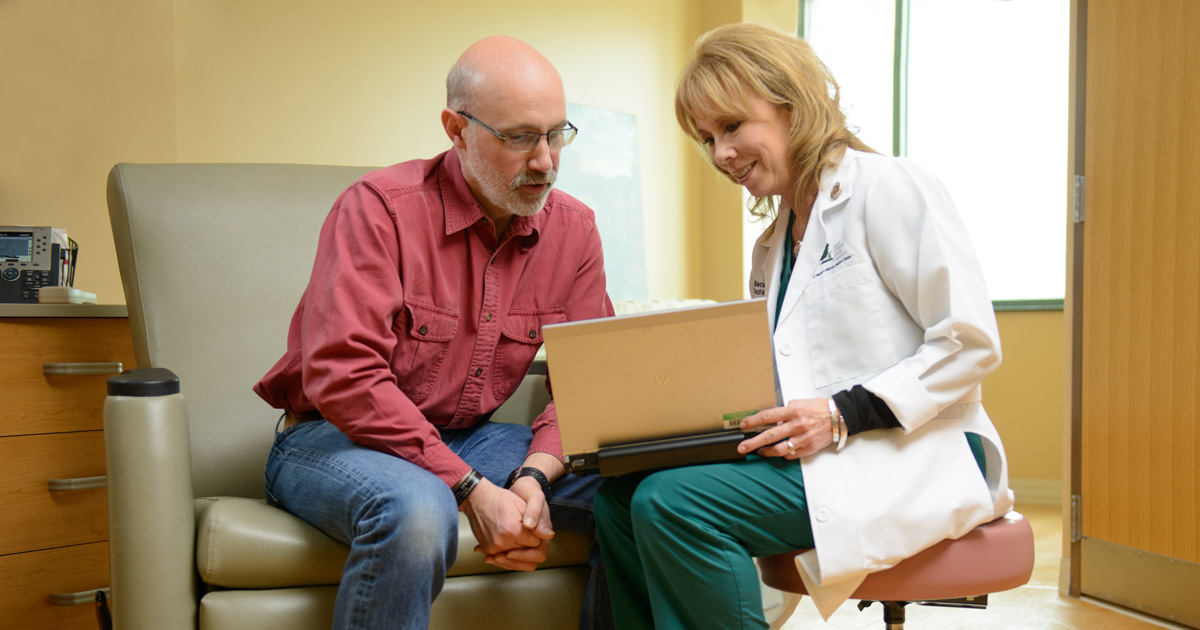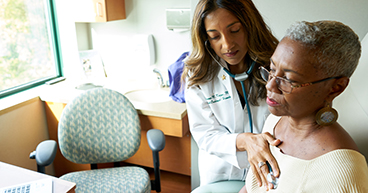
According to the American Cancer Society, colorectal cancer is the third most common cancer diagnosed in both men and women in the United States. Though the death rate from colorectal cancer has been dropping for decades, the disease is estimated to cause 51,020 deaths in 2019, underscoring the importance of having a basic knowledge of the disease and its associated risk factors.
The first step in prevention and early detection is understanding that colorectal cancer is a disease in which abnormal cells in the colon or rectum divide uncontrollably, ultimately forming a malignant tumor. The term “colorectal cancer” is used to describe cancer of the colon and/or rectum, which are often grouped together in describing one cancer because colon cancer and rectal cancer share many common characteristics. Together, the colon and rectum make up the large intestine, a question mark-shaped bowel that spans four feet.
What are potential risk factors?
Several risk factors are associated with the development of colorectal cancer, some of which can be controlled through lifestyle modifications like diet and exercise. Being aware of other factors like genetics and age may help you and your doctor develop a plan to reduce risks through tests and regular screenings. Risk factors to be aware of include:
Age: The likelihood of colorectal cancer diagnosis increases after the age of 40, rising sharply after 50. However, increasing incidence of colorectal cancer in young adults has raised concern in the medical community. Colorectal cancer is now in the top 10 most common cancers in people younger than 49. In 2018, the American Cancer Society lowered the suggested screening age from 50 to 45. If you are 45 or older, you should talk to your doctor about your screening and prevention options.
Family history: Individuals with family history of colorectal cancer or adenomatous polyps are at increased risk for developing colorectal cancer. If someone in your immediate family has a history of colorectal cancer or polyposis, talk with your doctor about obtaining earlier screening evaluations and prevention options.
Diet: A study published by PubMed Central reports meta-analyses (large pooled study analyses) show a 20 to 30 percent higher risk of developing colorectal cancer in people who eat more red and processed meats. Eating less red and processed meat while adding more fiber to your diet may help lower your risks. To get the fiber your body needs (25-35 grams per day), eat a well-balanced diet that includes fiber-rich foods like vegetables, fruits and whole grains.
Obesity: According to the National Cancer Institute, people who are obese are 30 percent more likely to develop colorectal cancer than people of average weight. Being physically active reduces your risk of colorectal cancer by 20 percent. Since exercise also reduces hypertension and insulin secretion, it’s even more important to be more active. The American Heart Association recommends at least 150 minutes per week of moderate-intensity aerobic activity, 75 minutes per week of vigorous aerobic activity and/or moderate to high-intensity muscle-strengthening activity at least twice a week.
Alcohol intake: Meta-analyses demonstrate that heavy alcohol users have a 60 percent greater risk of developing colorectal cancer than nondrinkers or moderate drinkers. Additionally, alcohol use is associated with developing colorectal cancer at a younger age. The Centers for Disease Control and Prevention defines moderate alcohol consumption as one drink per day for women and up to two drinks per day for men.
Smoking: Cancer-causing compounds associated with smoking increase risk of developing polyps, the precursor to cancer. A study published in the U.S. National Library of Medicine reports that nearly 12 percent of colorectal cancer deaths are attributable to smoking. The best way to limit risks associated with smoking cigarettes is to quit smoking altogether. However, alternatives such as nicotine gum and patches are available to those wishing to reduce their risk.
What are the steps to get screened?
Once you’ve determined your risk factors, screening may be a necessary step in managing your health. Several screening options are available for detecting signs of cancer and precancerous cells. As a medical oncologist focused on gastrointestinal malignancies at Cancer Treatment Centers of America (CTCA), Atlanta, I recommend an initial colonoscopy beginning at age 45 for people without high-risk factors (those would include strong family history of colorectal cancer or certain types of polyps, prior ulcerative colitis or Crohn’s disease, and known carriers of inherited syndromes such as Lynch or familial polyposis syndromes).
A colonoscopy can detect precancerous polyps so they can be removed before becoming cancerous. Screening may also help find colorectal cancer at an early stage, when there are more treatment options and a better chance of stronger outcomes. When detected early and treated appropriately, colorectal cancer has a nearly 90 percent five-year survival rate.
Colonoscopies can sometimes intimidate patients from getting screened, leading them to elect stool tests as an alternative. While technology has improved the accuracy of stool tests in detecting DNA mutations or signs of blood that may indicate cancer, negative results miss the possibility that small polyps may be lurking, posing risks of developing into tumors later.
The takeaway
The bottom line is colorectal cancer, in most circumstances, is preventable. Education regarding a healthy lifestyle and access to screening can significantly reduce risk of developing this potentially deadly disease. Stay on top of your health by knowing your risk factors and working with your doctor to schedule appropriate screenings, if needed.


